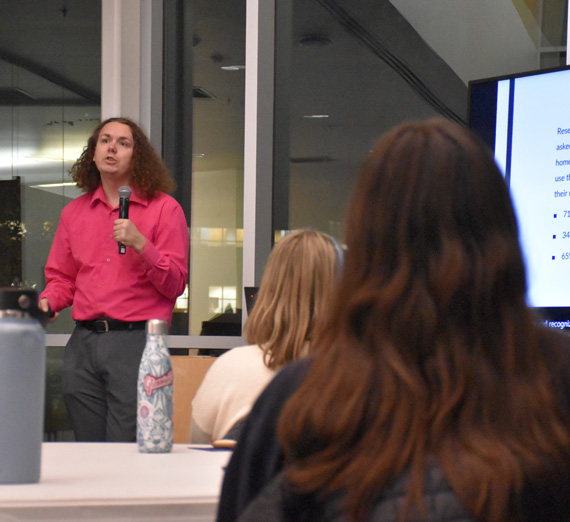Training From a SAGE

Teaching sexual and gender equity is not one- size-fits-all. Consider the range in audiences in a college community from those who are part of the LGBTQ+ community to students, staff and faculty at varying stages of understanding their own perceptions of what queer life and culture represents.
Matthew Barcus is a masterful educator. He is program manager of LGBTQ+ education and support in the Lincoln Center. He’s as humble as anyone could be. But his range of expertise, warmth and care in presenting to myriad audiences, coupled with his own lived experiences, give his work a firm foundation for the subject matter.
His undergraduate studies focused on social psychology with emphases on sexuality and gender, aging, prejudice and bias. During grad school he worked in the library, residence life, campus diversity office and served as a teaching assistant. Before Gonzaga, Barcus was coordinator of sexual and gender diversity at Bloomsburg University in Pennsylvania.
He has presented to student groups, clubs, university office staffs and whole divisions. He draws rave reviews.
Here’s one from Kate Vanskike in Marketing and Communications: “In a word, training with Matthew is ‘real.’ Not only does he provide authentic examples to learn from, he infuses the conversation with the Jesuit values we say we stand for, in ways that replace confusion with clarity. Matthew can take a challenging topic and remind us that our response is really simple: Treat people with respect and dignity.”
Barcus has no pretense about what his next audience will know or want to know about his topic. He is kind, clear and authentic. He came out 25 years ago, and he didn’t have the benefit of an LGBT center to help him deal with stigma some would put on him. “I read everything I could find,” he says.
The SAGE program was co-developed with Joan Iva Fawcett about five years ago, and Barcus wrote the curriculum with Debbie Brown, a graduate student from the Doctor of Leadership Studies program.
SAGE 1 training involves an introduction to the philosophy, terminology and best practices of sexual and gender equity. SAGE 2 deals with how to apply what you know to your work and lived experiences. Barcus uses realistic scenarios and experiences grounded in an approach of accompaniment instead of saviorism.
“Having been someone who received a lot of questions at a young age, I have empathy for people who have had that experience,” Barcus says. “I don’t take lack of understanding as willful. Most people are trying to be the best they can. Without the experience or the education how are they going to learn? SAGE training provides an opportunity for people to ask questions and not worry about being judged or shamed for not knowing,” he says.
Another program, SAGE Spotlight, takes a deeper dive into what it means to be gender diverse and how LGBTQ+ identity intersects with religion and spirituality.
“Because Matthew is willing to be vulnerable and share the ways that he has encountered new information, or made mistakes in terminology, or been corrected, he offers his own experiences as learning opportunities for others,” says Associate Professor Juliane Mora. “He meets people where they are. He brings them into the material with his humor and anecdotes and provides resources and guidance for how to approach new terminology and concepts.”
Among other things, Barcus has been instrumental in the University establishing gender equitable housing, gender inclusive bathrooms and signage in Hemmingson Center, created email signature templates and University name tags that allow individuals to display their pronouns, and expanded opportunities for continued education, SAGE being only one of them.
“He is a valuable resource in the Lincoln Center and across campus,” Mora says.
To schedule SAGE training, contact Barcus at barcas@gonzaga.edu.
